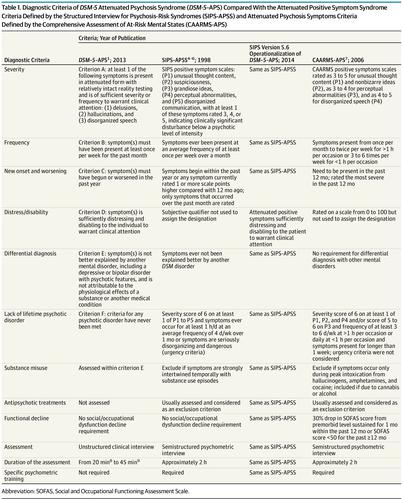JAMA Psychiatry ( IF 22.5 ) Pub Date : 2020-03-01 , DOI: 10.1001/jamapsychiatry.2019.3561 Gonzalo Salazar de Pablo 1, 2 , Ana Catalan 1, 3, 4, 5 , Paolo Fusar-Poli 1, 6, 7, 8

|
Importance Since the release of the DSM-5 diagnosis of attenuated psychosis syndrome (DSM-5–APS) in 2013, several research studies have investigated its clinical validity. Although critical and narrative reviews have reviewed these progresses, no systematic review has comprehensively summarized the available evidence regarding the clinical validity of DSM-5–APS.
Objective To provide current evidence on the clinical validity of DSM-5–APS, focusing on recent advances in diagnosis, prognosis, and treatment.
Evidence Review A multistep literature search using the Web of Science database, Cochrane Central Register of Reviews, Ovid/PsychINFO, conference proceedings, and trial registries from database inception to June 16, 2019, was conducted following PRISMA and MOOSE guidelines and PROSPERO protocol. Studies with original data investigating individuals diagnosed using DSM-5–APS or meeting comparable criteria were included. The results of the systematic review were summarized in tables and narratively synthesized against established evidence-based antecedent, concurrent, and prognostic validators. A quantitative meta-analysis was conducted to explore the cumulative risk of psychosis onset at 6, 12, 24, and 36 months in individuals diagnosed using DSM-5–APS criteria.
Findings The systematic review included 56 articles, which reported on 124 validators, including 15 antecedent, 55 concurrent, and 54 prognostic validators. The epidemiological prevalence of the general non–help-seeking young population meeting DSM-5–APS criteria was 0.3%; the prevalence of individuals meeting DSM-5–APS criteria was variable in clinical samples. The interrater reliability for DSM-5–APS criteria was comparable with that of other DSM-5 mental disorders and can be optimized by the use of specific psychometric instruments. DSM-5–APS criteria were associated with frequent depressive comorbid disorders, distress, suicidality, and functional impairment. The meta-analysis included 23 prospective cohort studies, including 2376 individuals. The meta-analytical risk of psychosis onset was 11% at 6 months, 15% at 12 months, 20% at 24 months, and 23% at 36 months. Research into predisposing and precipitating epidemiological factors, neurobiological correlates, and effective treatments for DSM-5–APS criteria has been limited.
Conclusions and Relevance Over recent years, DSM-5–APS criteria have received substantial concurrent and prognostic validation, mostly driven by research into the clinical high-risk state for psychosis. Precipitating and predisposing factors, neurobiological correlates, and effective treatments are undetermined to date.
中文翻译:

DSM-5 减毒精神病综合征的临床有效性:诊断、预后和治疗的进展。
重要性 自2013 年 DSM-5对轻度精神病综合征的诊断 ( DSM-5- APS ) 发布以来,多项研究调查了其临床有效性。尽管批判性和叙述性评论回顾了这些进展,但没有系统回顾全面总结有关DSM-5- APS临床有效性的现有证据。
目的 为DSM-5- APS 的临床有效性提供当前证据,重点关注诊断、预后和治疗方面的最新进展。
证据审查 从数据库开始到 2019 年 6 月 16 日,使用 Web of Science 数据库、Cochrane 中央审查登记册、Ovid/PsychINFO、会议论文集和试验登记册进行多步骤文献检索,遵循 PRISMA 和 MOOSE 指南以及 PROSPERO 协议。纳入原始数据调查使用DSM-5 –APS 诊断或符合可比标准的个体的研究。系统评价的结果在表格中进行了总结,并针对已建立的基于证据的先例、并发和预后验证器进行了叙述性综合。进行了一项定量荟萃分析,以探索使用DSM-5 -APS 标准诊断的个体在 6、12、24 和 36 个月时的精神病发作累积风险。
结果 系统评价包括 56 篇文章,报告了 124 个验证器,包括 15 个先行验证器、55 个并发验证器和 54 个预后验证器。符合DSM-5- APS 标准的一般非求助青年人口的流行病学流行率为 0.3%;符合DSM-5- APS 标准的个体的患病率在临床样本中是可变的。DSM-5- APS 标准的评估者间可靠性与其他DSM-5精神障碍相当,并且可以通过使用特定的心理测量工具进行优化。帝斯曼-5–APS 标准与频繁的抑郁合并症、痛苦、自杀和功能障碍相关。荟萃分析包括 23 项前瞻性队列研究,包括 2376 名个体。精神病发作的荟萃分析风险在 6 个月时为 11%,在 12 个月时为 15%,在 24 个月时为 20%,在 36 个月时为 23%。对DSM-5- APS 标准的诱发和诱发流行病学因素、神经生物学相关性和有效治疗的研究有限。
结论和相关性 近年来,DSM-5- APS 标准已经获得了大量的同时和预后验证,主要是由对精神病临床高危状态的研究推动的。迄今为止,诱发因素和诱发因素、神经生物学相关性以及有效的治疗方法尚未确定。











































 京公网安备 11010802027423号
京公网安备 11010802027423号